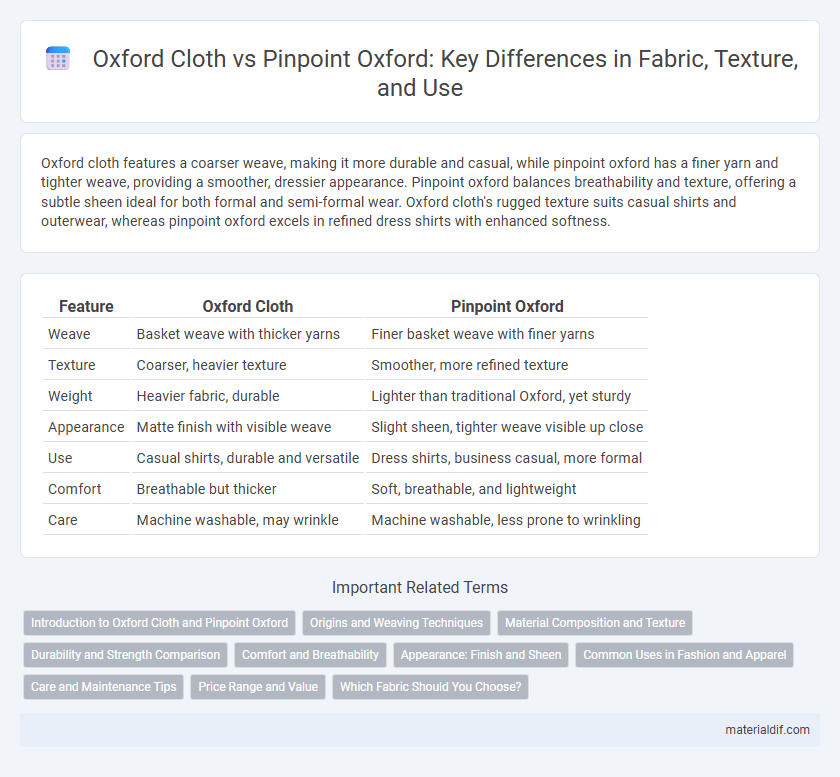Oxford cloth features a coarser weave, making it more durable and casual, while pinpoint oxford has a finer yarn and tighter weave, providing a smoother, dressier appearance. Pinpoint oxford balances breathability and texture, offering a subtle sheen ideal for both formal and semi-formal wear. Oxford cloth's rugged texture suits casual shirts and outerwear, whereas pinpoint oxford excels in refined dress shirts with enhanced softness.
Table of Comparison
| Feature | Oxford Cloth | Pinpoint Oxford |
|---|---|---|
| Weave | Basket weave with thicker yarns | Finer basket weave with finer yarns |
| Texture | Coarser, heavier texture | Smoother, more refined texture |
| Weight | Heavier fabric, durable | Lighter than traditional Oxford, yet sturdy |
| Appearance | Matte finish with visible weave | Slight sheen, tighter weave visible up close |
| Use | Casual shirts, durable and versatile | Dress shirts, business casual, more formal |
| Comfort | Breathable but thicker | Soft, breathable, and lightweight |
| Care | Machine washable, may wrinkle | Machine washable, less prone to wrinkling |
Introduction to Oxford Cloth and Pinpoint Oxford
Oxford cloth is a durable, basketweave fabric made from cotton, characterized by its slightly rough texture and balanced weight, commonly used in dress shirts. Pinpoint Oxford distinguishes itself with a finer yarn and tighter weave, producing a smoother, more refined surface while retaining the durability and breathability of traditional Oxford cloth. Both fabrics offer comfort and versatility, but Pinpoint Oxford provides a polished look suitable for formal settings, whereas standard Oxford cloth leans towards casual wear.
Origins and Weaving Techniques
Oxford cloth originated in Scotland during the 19th century, characterized by a basketweave structure using a blend of cotton yarns for durability and a soft texture. Pinpoint Oxford, a refined variation, employs a finer, tighter basketweave with smoother yarns, resulting in a more polished appearance and enhanced strength. Both fabrics share a weaving technique that interlaces multiple yarns simultaneously, but Pinpoint's denser weave produces a distinctive, subtle texture favored in dress shirts.
Material Composition and Texture
Oxford cloth is typically woven from a blend of cotton and polyester, offering a soft yet durable texture with a basketweave pattern. Pinpoint Oxford is made from finer, higher-quality cotton yarns, creating a tighter weave that delivers a smoother, more refined texture with a subtle sheen. The material composition and weaving technique make Pinpoint Oxford more breathable and lightweight compared to the slightly heavier, coarser Oxford cloth.
Durability and Strength Comparison
Oxford cloth features a basket weave that provides moderate durability making it suitable for casual and formal shirts. Pinpoint Oxford utilizes a finer yarn with a tighter weave, enhancing its strength and resistance to wear, resulting in a more durable fabric ideal for frequent use. The denser texture of Pinpoint Oxford offers superior longevity compared to traditional Oxford cloth without sacrificing softness.
Comfort and Breathability
Oxford cloth offers a soft, durable texture with moderate breathability, making it suitable for everyday wear. Pinpoint Oxford fabric combines a tighter weave with a slightly smoother finish, providing enhanced comfort while maintaining excellent airflow. Both fabrics deliver reliable breathability, but Pinpoint Oxford is favored for a dressier look without sacrificing comfort.
Appearance: Finish and Sheen
Oxford cloth features a basketweave pattern with a slightly rougher texture and a matte finish, giving it a casual and relaxed appearance. Pinpoint Oxford uses finer yarns and a tighter weave, resulting in a smoother surface with a subtle sheen that adds a touch of elegance. The enhanced finish of Pinpoint Oxford makes it suitable for both formal and semi-formal shirts, distinguishing it from the more rugged look of traditional Oxford cloth.
Common Uses in Fashion and Apparel
Oxford cloth is commonly used for casual and semi-formal shirts due to its slightly rough texture and durable weave, making it ideal for everyday wear and business casual settings. Pinpoint Oxford, with its finer yarns and tighter weave, offers a smoother, more refined appearance suited for dress shirts and professional attire. Both fabrics are popular in men's fashion but Pinpoint Oxford is favored when a more polished, crisp look is desired.
Care and Maintenance Tips
Oxford cloth is durable and easy to care for, typically requiring machine washing in cold water and tumble drying on low heat to maintain its structure and color. Pinpoint Oxford, known for its finer weave and softer texture, demands gentler care, such as gentle cycle washing and air drying to prevent fabric damage and preserve its smooth finish. Both fabrics benefit from ironing on low to medium heat while slightly damp to reduce wrinkles and extend garment longevity.
Price Range and Value
Oxford cloth typically falls within a moderate price range due to its balanced durability and comfort, making it a popular choice for everyday dress shirts. Pinpoint Oxford commands a slightly higher price because of its finer yarns and tighter weave, offering a smoother texture and enhanced durability. The added value of Pinpoint Oxford lies in its refined appearance and longer lifespan, justifying the price difference for consumers seeking quality and sophistication.
Which Fabric Should You Choose?
Oxford cloth offers a balanced combination of durability and softness, making it ideal for casual and semi-formal shirts, while Pinpoint Oxford features a tighter weave and smoother texture, suited for dressier occasions. Consider the occasion and comfort preferences when choosing; Oxford cloth provides breathability and a slightly rougher finish, whereas Pinpoint Oxford delivers a more refined appearance with enhanced fabric resilience. Selecting Pinpoint Oxford is preferable for polished, professional settings, whereas classic Oxford cloth suits everyday wear with reliable durability.
Oxford cloth vs Pinpoint oxford Infographic

 materialdif.com
materialdif.com